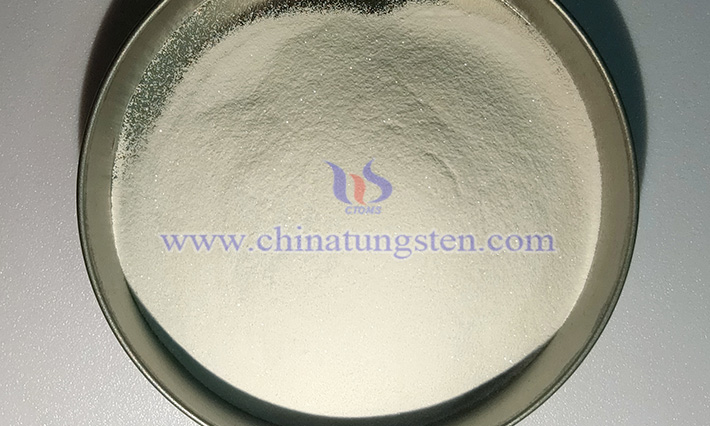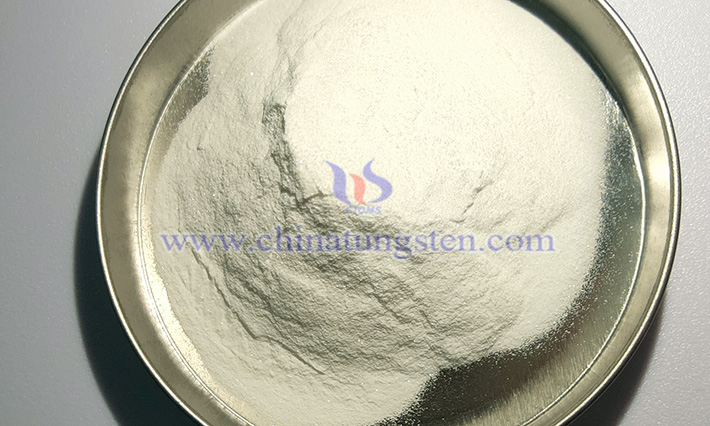Effect of Ammonium Ion Concentration on the Properties of Ammonium Metatungstate
- Details
- Category: Tungsten Information
- Published on Wednesday, 23 April 2025 15:32
Ammonium Metatungstate (AMT), a tungstate compound produced by CTIA GROUP LTD, consists of ammonium ions (NH₄⁺), hydrogen ions, tungstate ions, and crystal water, with the chemical formula (NH₄)₆H₂W₁₂O₄₀·xH₂O. The proportions of these components and crystal water may vary slightly depending on the preparation method and conditions. During AMT synthesis, the concentration of ammonium ions significantly influences the crystal morphology, particle size, and properties of the product, including solubility, thermal stability, chemical stability, and catalytic performance.

I. Impact of Ammonium Ion Concentration on Solubility
The concentration of ammonium ions markedly affects AMT’s solubility. Higher NH₄⁺ concentrations increase the ionic strength of the solution, enhancing the electrostatic interactions between NH₄⁺ and the Keggin-type anion [H₂W₁₂O₄₀]⁶⁻ in the crystal structure, which can reduce the dissolution rate. However, during preparation, an appropriate ammonium ion concentration stabilizes the Keggin structure, preventing its dissociation into mononuclear tungstate ions in solution, thus maintaining AMT’s high solubility (>3,000 g/L at 25°C). Excessive NH₄⁺ concentrations may lead to the precipitation of byproducts, such as ammonium paratungstate (APT), which reduces AMT’s solubility and purity. Therefore, optimizing ammonium ion concentration is critical for producing AMT with high solubility.
II. Impact of Ammonium Ion Concentration on Thermal Stability
AMT undergoes a stepwise thermal decomposition process involving dehydration, NH₄⁺ decomposition, and collapse of the Keggin structure. Higher ammonium ion concentrations may increase the NH₄⁺ content in the crystal, influencing the thermal decomposition temperature. Studies indicate that AMT with higher NH₄⁺ content decomposes more rapidly at 300-400°C, releasing greater amounts of NH₃ gas, which may cause premature disruption of the crystal structure. Conversely, lower NH₄⁺ concentrations may expose more active sites on the Keggin anion, delaying the decomposition temperature and enhancing thermal stability. This balance is crucial for applications requiring thermal processing, such as catalyst preparation.

III. Impact of Ammonium Ion Concentration on Chemical Stability
The ammonium ion concentration affects AMT’s chemical stability across different pH environments. In acidic or neutral solutions, NH₄⁺ provides a buffering effect, stabilizing the Keggin structure and preventing its dissociation into mononuclear tungstate ions. Higher NH₄⁺ concentrations enhance this buffering capacity, improving AMT’s stability in acidic environments, which is vital for catalytic applications. However, in strongly alkaline conditions, excessive NH₄⁺ concentrations may lead to NH₃ volatilization, destabilizing the crystal structure and making AMT more prone to decomposition. Thus, precise control of ammonium ion concentration is essential to ensure AMT’s chemical stability in various chemical systems.
IV. Impact of Ammonium Ion Concentration on Catalytic Performance
As a precursor for catalysts, AMT’s catalytic performance is significantly influenced by ammonium ion concentration. NH₄⁺ modulates the acidity of the crystal surface, affecting catalytic activity. Higher NH₄⁺ concentrations may increase surface alkalinity, potentially reducing acid catalytic activity but enhancing activity in oxidation reactions by altering the electronic structure. Additionally, ammonium ion concentration influences the crystal form and defect structure of WO₃ formed after AMT’s thermal decomposition, impacting the catalyst’s specific surface area and the distribution of active sites. Optimizing NH₄⁺ concentration ensures the desired catalytic properties for applications in petrochemical processes and environmental catalysis.
- Chinatungsten Online: ammonium-metatungstate.com
- CTIA GROUP LTD: en.ctia.group
- Tungsten News & Price: www.ctia.com.cn
- Molybdenum News & Price: news.molybdenum.com.cn
- Tel.: 86 592 5129696; Email: sales@chinatungsten.com



 sales@chinatungsten.com
sales@chinatungsten.com